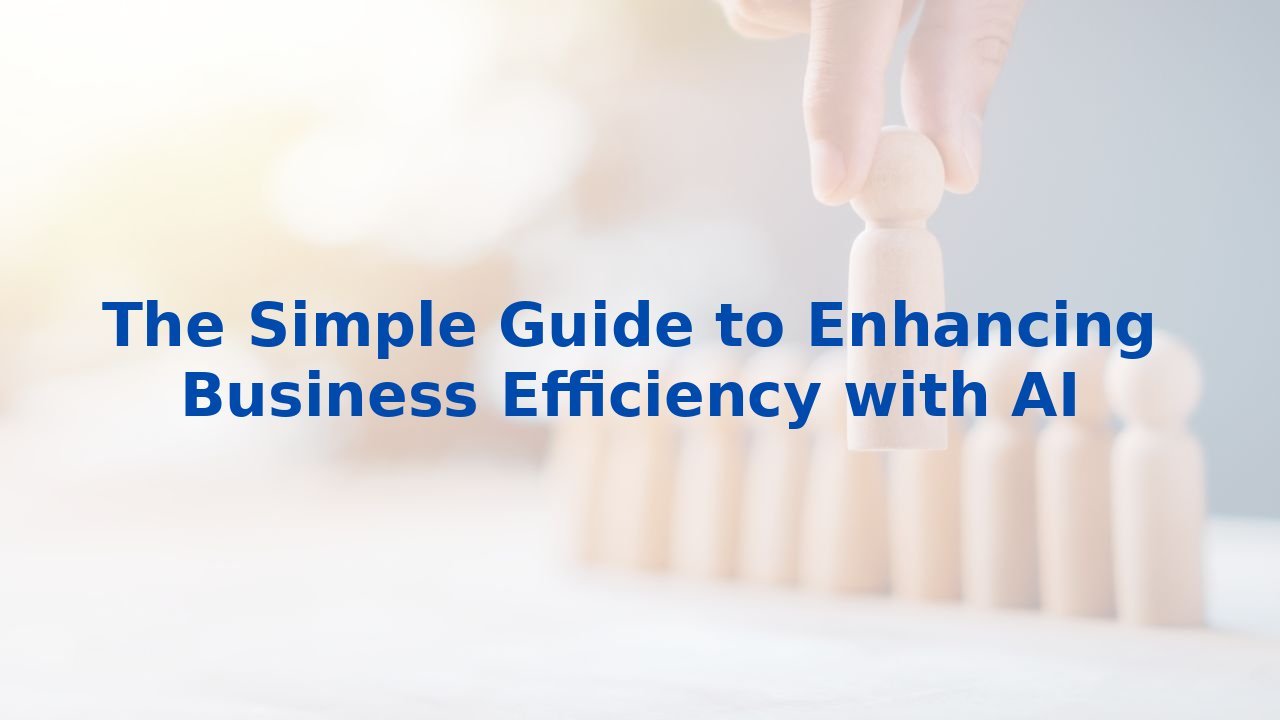The Simple Guide to Enhancing Business Efficiency with AI
The Simple Guide to Enhancing Business Efficiency with AI
In an era where technology reigns supreme, Artificial Intelligence (AI) has emerged as a game changer for businesses across the globe. Its remarkable ability to streamline operations, enhance service delivery, and foster innovation cannot be overstated. As organizations aim for increased efficiency, embracing AI becomes essential for carving a competitive edge and unlocking unprecedented value. This guide will illustrate how various business processes can be enhanced by AI and explore the multiplying benefits it brings to organizations.
General Business Processes Enhanced by AI
1. Digital Marketing
AI is revolutionizing the landscape of digital marketing. The creation of content, once a time-consuming endeavor, can now be achieved at an astonishing pace with the help of AI tools. Imagine generating captivating blog posts, social media updates, and marketing materials seamlessly. This capability not only keeps your brand voice consistent but also enables deeper engagement with your audience.
Moreover, AI-driven algorithms facilitate personalization. By analyzing vast troves of customer data, brands can craft tailored marketing campaigns that resonate more profoundly with their audience, ultimately leading to increased conversions and heightened customer satisfaction.
2. Human Resource Management
In HR, the recruitment process traditionally riddled with tedious tasks can be expedited through AI. Automating resume screening and initial interviews drastically reduces the time and manpower needed to find the right fit for your organization. In addition, AI platforms offer personalized training experiences for employees, thereby enhancing their development and skill acquisition through tailored learning.
3. Customer Service
Customer service has witnessed a transformative shift with AI-powered chatbots. Operating round-the-clock, these chatbots handle inquiries, ensuring immediate responses and thereby boosting customer satisfaction. Through predictive analytics, AI delves into data to identify potential issues before they arise, allowing organizations to address concerns proactively.
4. Financial Management
AI's prowess extends to financial management as well. Conducting financial analysis is expedited with AI, which can efficiently identify trends, forecast market movements, and guide optimal financial decisions. Furthermore, automating accounting tasks such as invoicing and expense tracking significantly reduces errors and culminates in remarkable efficiency.
Benefits of AI in Business Processes
1. Increased Efficiency
One of AI's standout contributions is its ability to automate mundane tasks, liberating employees to focus on strategic initiatives and creative endeavors. The rapid processing of large volumes of data equips businesses with insights that might otherwise elude human analysts.
2. Improved Accuracy
AI minimizes human error and ensures consistency across operations. By relying on data rather than intuition, AI-driven systems make informed decisions that align with organizational goals.
3. Enhanced Customer Experience
Personalization in marketing and customer service is a cornerstone of improved engagement. The convenience provided by AI chatbots and virtual assistants elevates the overall customer experience, fostering loyalty and trust.
4. Data-Driven Decision Making
AI's capability to analyze extensive data sets fosters a culture of data-driven decision-making, guiding managers through actionable insights to tackle challenges and seize opportunities. By predicting future trends, businesses are better poised to navigate complexities ahead.
The Importance of Training Employees for AI
However, as organizations pivot towards AI adoption, equipping their workforce with essential training is paramount. Individuals need to understand both the capabilities and limitations of AI to avoid over-reliance on technology. Recognizing when human ingenuity is paramount becomes a critical skill that sharpens workplace dynamics. Furthermore, employees should be instructed on formulating effective prompts for AI tools, maximally leveraging these digital allies.
An equally vital component is fostering the aptitude to evaluate AI outputs critically. This includes assessing the accuracy and relevance of AI-generated results, ensuring that the data remains free from biases. Seamless integration of AI into daily workflows is necessary, as employees leverage these tools to enhance productivity and decision-making every day.
By investing in AI training and certification, organizations can transform their workforce into a tech-savvy powerhouse ready to conquer with innovation and efficiency at the forefront. The success of AI implementation not only hinges on technology but also on the people behind the screens.
Conclusion
As the AI landscape continues to evolve, businesses are presented with boundless opportunities to enhance efficiency and redefine their operational paradigms. From digital marketing to customer service, the potential is vast. By integrating AI into core processes and investing in employee training, organizations can elevate their capabilities while nurturing an agile, adaptive workforce ready to face the challenges of tomorrow. Embracing AI isn't just about technology; it’s about transforming mindsets and operations for lasting success.



